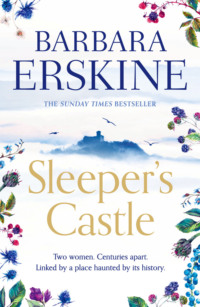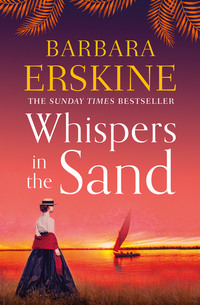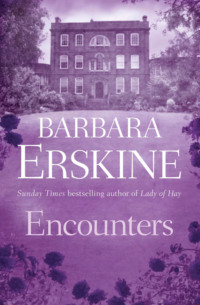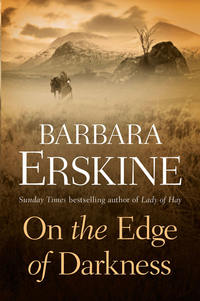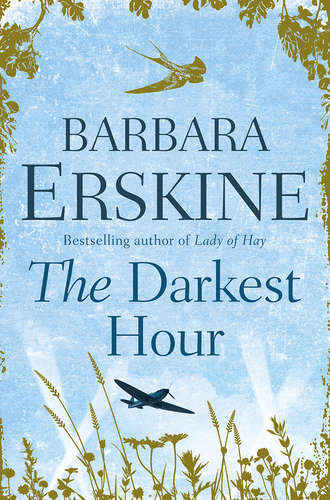
Полная версия
The Darkest Hour
In the painting the figure of the young airman was clear now, standing behind Evelyn, his hand on her shoulder, his eyes gazing past her out of the picture. Who were they looking at? Not someone they welcomed, surely. Both looked angry and defensive. Only the touch of his fingers on her sweater was gentle. Lucy could sense the reassurance there. And the love.
By next morning her excitement had returned and she showed the painting to Robin.
‘That is extraordinary,’ he said. ‘We had no idea he was there. Do you think Lol had spotted him? Do you know if he had the painting X-rayed?’
Lucy shook her head. ‘I think that must be what he was going to discuss with Professor Solomon. He took lots of photos, some in close-up. He must have sensed something because there was no sign of it. None at all. I looked with the magnifying glass. It was only when I began to clean it that I spotted something underneath.’ She turned to face him and for the first time in ages he saw the spark of excitement in her eyes.
‘I’ve made my mind up, Robin. I’m going to try and find out more. I owe it to Larry, you’re right, and I owe it to Evelyn as well. I want to know who this young man was and why he was painted out.’
2

Friday 28th June
The cottage where Evelyn Lucas had spent the last years of her life stood on a bank above a narrow lane. The hedges were thick and verdant, hazel and dogwoods threaded through with honeysuckle and wild roses. Lucy stood for a moment looking up at the front of the cottage. It was like a painting by Helen Allingham. The ancient peg-tiled roof was furred with moss and lichen above flint walls and windows with small diamond-shaped leaded panes; the wooden porch was covered with clematis. Pushing open the gate Lucy climbed the steps to the front door and reached for the bell pull. She heard a chime somewhere deep in the house.
Carrying on her shoulder a bag containing a notebook, a camera, and a small digital audio recorder, she had left her car in a lay-by just outside the village and walked down the lane, timing her arrival perfectly for four o’clock. It had taken quite a bit of detective work to find the location of the cottage and even more to trace a contact number but she had in the end managed to speak to Evelyn’s former housekeeper. The cottage was to her delight still owned by a member of the family.
As she stood waiting for a response a thrush burst into song somewhere in the garden behind a lavender hedge to her right. To the left a sloping lawn led up towards a hedge of myrtle behind which she saw the roof of the building she was pretty certain must be the studio. Beyond the studio the Downs sloped up towards the intense blue of the sky. She could see the swallows darting and swooping over the fields.
At last she heard footsteps approaching. As the door opened she found herself momentarily thrown by the appearance not of the elderly woman she had been expecting, but of a tall man in his mid-thirties. His hair was a dark blond, severely brushed back from a deep forehead, his eyes a clear dusky blue, full of suspicion now, though they betrayed laughter lines at the outer corners. Most unexpectedly of all, given the rural location, he was formally dressed in a dark blue suit and a tie.
‘I’m sorry.’ She took a step back. ‘Have I come to the wrong address? I was looking for Evelyn Lucas’s cottage.’ She knew it was the right address and now she guessed who this was.
‘No, this is the right place.’ He waited. ‘How can I help you?’ His tone was not encouraging.
‘I spoke to a lady. Mrs Davis? She was expecting me.’
‘Ah.’ He gave her an austere smile. ‘My housekeeper. She has gone home I’m afraid.’
Lucy could feel an overwhelming sense of disappointment beginning to drown her excitement. It had taken a lot of persuasion to get Mrs Davis to agree to let her come over and see the house. ‘We are not open to the public, you know,’ she had said down the phone, her soft Sussex accent gentle but nevertheless determined. ‘The owner, he doesn’t like people coming any more. I’m sorry.’
Sensing it was not the moment to talk about detailed research or the production of a book Lucy had merely described herself as an art student, deeply involved in studying Evelyn’s work. ‘I would so love to see where she painted,’ she had said. ‘I am sorry. I had understood you allowed people access to her studio.’
On the phone her conversation with Mrs Davis had ground to a halt at that point. And there had been a few moments silence. ‘That was before Mr Michael moved in,’ Dolly Davis had said at last. ‘He doesn’t want people poking around here. This is his home now, you see.’
‘Mr Michael?’ Lucy had felt at a sudden disadvantage. Should she know who he was?
Mrs Davis had provided the information without the need of further questioning. ‘He is Evie Lucas’s grandson. He inherited the cottage when his father died. Before that they did allow study groups here from time to time, you’re right, but Mr Michael, he likes his privacy.’
‘But surely, this is a place of national importance. He can’t just refuse to let people see it,’ Lucy said, with some indignation, perhaps betraying more vehemence than she realised.
They had talked for several minutes before at last Mrs Davis had agreed to allow her to visit the studio the following Friday afternoon. ‘Only a quick peep, you understand,’ she had said as they hung up. ‘I wouldn’t want Mr Michael to be upset.’
Mr Michael, it appeared, was only using the place at weekends. He lived and worked in London and should have returned there, but now here he was standing in front of her and he showed every sign of being if not upset then at least angry and intransigent.
She became aware suddenly that he was waiting for her to say something. This might be her last chance. On the other hand, she didn’t want to antagonise him, or to get Mrs Davis into trouble. Playing for time she held out her hand. ‘How do you do. I am Lucy Standish.’
Taken aback he hesitated for a moment before he took her hand and shook it. ‘Michael Marston,’ he said gravely. He had a strong handshake; he did not smile. Again he waited.
She found herself suddenly wishing she had taken more care with her appearance before leaving home. Her hair was scraped back as usual, held in an unsophisticated ponytail by a rubber band, she was wearing no make-up and she was dressed in a shirt and jeans. She gave a small audible sigh. ‘OK, I give up. I am so sorry. I don’t want to get your housekeeper into trouble. It’s all my fault. I somehow managed to persuade her to let me have a quick look at Evelyn’s, that is, your grandmother’s, studio. I have been studying her work and it would mean so much to me. She, that is your housekeeper, explained that it is no longer open to the public and I can quite understand that. I am truly sorry.’ She was rattling on and she knew it. Shaking her head she turned away. ‘I am sorry. I will go. Of course, I will go. Please don’t be angry with her. She is so proud of Evelyn and she understood how I felt. I didn’t mean to intrude.’
‘Stop!’
Michael Marston had folded his arms during her anguished soliloquy. He shook his head slowly. ‘Do you ever let anyone else get a word in edgeways? No wonder you talked your way under Dolly’s guard.’
Lucy bit her lip. ‘I’m sorry.’ He was making her feel like a small child.
‘Stop apologising.’ He smiled at last. It lit his face but it also betrayed how exhausted he looked. ‘I am sure that just this once I could make an exception and allow you to come in as you’ve come all this way. I wasn’t expecting I would be here this afternoon, and obviously neither was Dolly. No wonder she was so reluctant to leave me here and take the time off.’ He stood back and beckoned her to follow him into the shadowy hallway. ‘Please follow me. What did you say your name was?’
Repeating her name, Lucy followed him into a long low living room. With windows back and front open onto the garden the whole place smelled of newly cut grass and roses. She stared round in delight. ‘This is lovely.’
‘Indeed. She adored this place. She could never be persuaded to move once she found Rosebank Cottage.’
‘She painted this room, didn’t she? As a backdrop to some of her best portraits.’
He nodded. ‘And got slated by the critics for it. Too chocolate box like some of her wartime pictures, but as you probably know, that wasn’t really her style.’ He made his way between an easy chair and a sofa, placed on either side of an open fireplace, heading towards the French doors which led out into the back garden. Lucy glanced at the hearth. It was empty now save for an arrangement of dried flowers.
He led the way outside and up some narrow mossy steps into the upper garden and towards the building which Lucy had already guessed was the studio. Built of timber framing, infilled with dark red brick, it was single storey but with a high-pitched roof, tiled like the house but with skylights on the north-facing pitch to add to the light from the large windows. The walls were curtained with wisteria and roses.
Groping in his pocket Michael Marston produced a key-ring and inserted one of the keys into the door. He moved aside and waved her in ahead of him. She stepped over the threshold with bated breath instantly forgetting him as she took in the large high-ceilinged room in which she found herself. Though Evelyn had been dead for many years it was as if she had just walked out for a few minutes. Her brushes and palette knives were lying on the table near her easel with a selection of squeezed tubes of oil paint. As Lucy took a step or two closer she saw that they were dried up and split, but she could still smell the linseed oil, the turpentine. She squinted at the painting on the easel and realised with sudden disappointment that it was a print of one of Evelyn’s best-known works, the one which currently hung in Tate Britain. Slowly she began to walk round the room. On the large paint-stained wooden table several sketchbooks lay open. She went closer to look. Two of the walls were lined with shelves still laden with tins and boxes and rolls of paper. Several canvasses were stacked against one wall and more paintings hung on the other walls.
‘None of them are originals, I’m afraid.’ Michael Marston’s voice came from the doorway. She had actually forgotten he was there.
She turned towards him. ‘It is wonderful. It still retains so much atmosphere. As if she had just this minute left.’
He gave a faint smile. He had loosened his tie, she noticed, and undone the top button of his shirt. It made him look marginally more relaxed. ‘She was like that. She had a powerful personality.’
‘Do you remember her?’
He nodded. ‘Very well!’
‘You must miss her.’
‘It would be strange if I didn’t. She was my grandmother.’ He folded his arms. ‘If you’ve seen enough –’ He was clearly impatient for her to go.
She felt a pang of dismay. Not already. She hadn’t seen nearly enough. She gave him a faint smile. ‘Of course, I’m sorry. I’ll leave now.’ She paused for a moment, wondering if she dare ask if she could take some photos or even if she could come again. ‘I don’t suppose,’ she hesitated again. ‘I don’t suppose I could come back some other time when it is more convenient?’
He was heading for the door. She had a fraction of a second to make up her mind, to tell him now honestly why she was there. She had to tell him something if she wanted his co-operation but was now, when he was tired and impatient, the time to speak to him? He had turned back and was watching her, she realised, a spark of interest in his gaze for the first time.
‘Could I explain why I’m here?’ she said at last. ‘There is a specific reason for my interest. I know you want me out of your hair. It will only take a minute, I promise.’ She hoped she didn’t sound as though she was wheedling.
He leaned against the doorframe, his arms still folded. ‘Go on.’
‘I am an art historian by training. I am particularly interested in women war artists. People like Dame Laura Knight, Dorothy Coke, Mary Kessell and, of course, Evelyn Lucas. She was special because she came from Sussex and she was here during the Battle of Britain, and of course most if not all of the artists who painted the action were men; I’m compiling a catalogue of her work and I would love to find out more about her. I want to write a book about her.’ She fell silent, watching his face.
‘You’re working on your PhD?’
He sounded faintly patronising.
She smiled. ‘I have my PhD.’
She felt an altogether unworthy flicker of triumph as he acknowledged his mistake with a slight nod of the head.
‘This is a project for a full-length biography,’ she added.
He said nothing for a while, frowning, then, ‘My grandmother was a very private person. She didn’t want people poking into her personal affairs.’
‘I can understand that.’ Lucy dropped her bag at her feet and perched on the edge of the table. She leaned forward slightly, unaware that the open-necked shirt with its rolled-up sleeves was alluring in its own understated way, as was the eagerness in her expression. ‘But would she mind now? After all, your father opened this place to the public. He can’t have thought she would object all that much or he wouldn’t have done that, would he?’
‘True.’ He shifted slightly. ‘I took the decision to close it because I valued my privacy. I’m more like her than my father was. Besides, he never lived here full time. That was why she left it to me. He kept an eye on it, and, yes, allowed people here, but after he died I decided to use it as a weekend cottage. I didn’t want strangers here any more.’
‘I wouldn’t get in your way.’
He was watching her. He looked distinctly uncomfortable. ‘Are you a painter yourself?’ he asked eventually.
She shook her head. ‘I’m a writer. A historian. My husband and I run, ran, an art gallery in Chichester.’
‘Ran?’ He had noticed the change of tense.
‘I suppose I still do. He was killed in a car crash three months ago.’
She was surprised to find she could say it without faltering.
‘I’m sorry.’ He pushed himself away from the door and seizing his tie, pulled it off. ‘So you haven’t come a long way after all.’
‘I didn’t actually say I had,’ she remonstrated gently.
He gave a wry smile. ‘No, you didn’t. Sorry. You had better come inside the house.’ He was coiling the tie round his fist. Turning, he led the way out into the garden.
Picking up her bag she followed him and waited while he locked the door behind them. As they retraced their steps into the cottage and through the living room Lucy smiled at him uncomfortably.
‘I am really sorry to have intruded on your afternoon off. I was going to write to you once I had spoken to Mrs Davis and seen the studio.’
He dumped the tie on the bookshelf. The room had a homely, old-fashioned feel; at a guess, there was no woman in his life apart from the doubty Mrs Davis.
‘And you were hoping, presumably, that I will have lots of information about Evie to fill out your project for you.’
She pulled a face. ‘I’m not asking you to write it for me, but obviously I would be very grateful for any pointers. As I said, apart from old exhibition catalogues there doesn’t seem to be much out there. Even the Tate doesn’t appear to know anything beyond her dates.’
‘Perhaps it is a pointless exercise. Perhaps there is nothing.’
‘There has to be something.’ She heard a hint of desperation in her own voice. Its intensity surprised her. ‘Her paintings must have a history behind them. The Battle of Britain series is iconic. The pictures of the airfield at Westhampnett, the Spitfires. Not really a woman’s subject.’
‘Ah well, that’s easily explained. Her brother, Ralph,’ he pronounced it Rafe, ‘my great-uncle, was a fighter pilot in a Spitfire squadron.’
‘I see. I didn’t know even that.’ Lucy felt a wave of disappointment. It was likely then, that the young man in the portrait was Evelyn’s brother. Somehow, already in her own mind, he was her lover, a source of mystery and romance, just as in her own mind there was now no real doubt as to the picture’s provenance. Evelyn’s story had caught her imagination in a way it had failed to before. At the beginning it had been of more academic interest, now, since she had seen the young man with his hand on her shoulder, and since seeing her studio and her home, Evelyn had become real to her.
She still hadn’t mentioned the portrait to Michael, she realised. The fact that she owned a possible Lucas original was crucial; it had been the reason behind the decision to research Evelyn’s life, to find out where the picture fitted into her oeuvre, to date it and, since she had uncovered him, to identify the young man with his hand so affectionately on her shoulder.
‘Did she live here during the war?’ Lucy sat down uninvited on the arm of the sofa by the window. She felt more comfortable with her host now, more relaxed. His initial suspicion of her seemed to have lessened.
He shook his head. ‘She still lived at home with her parents during the war. Her father was a farmer over near Goodwood. She inherited the farm after they died, then she sold up and bought this place. I can give you the address of the farm if you like, then you can go and pester them.’ His smile compensated slightly for the harshness of the words. He glanced at his watch and gave an exclamation of dismay. ‘I’m sorry. I do have to get on. I’m expecting someone. If you would like to give me your address and contact details I will get in touch with some suggestions about where you could start your research if I think of anything.’
‘So, you don’t mind my doing it?’ She was disappointed at the sudden change of mood after he had seemed to be mellowing towards her, but at the same time elated that he appeared to be agreeing to help her with the project. She reached into her bag to find the gallery’s card. ‘You’ll find my e-mail and phone number there.’
‘And you are?’ He was examining the card.
‘Lucy Standish. I told you.’ Twice to be precise.
He grinned, acknowledging the slight tetchiness of her tone. ‘I’m sorry. I didn’t take it in.’
And then she was outside and he had shut the door behind her.
Walking slowly back up the lane she noticed a car parked in the lay-by behind her own. A woman climbed out, locked it and turned towards her. They approached one another, exchanged the rather awkward smiles of strangers in a situation where they cannot avoid acknowledging each other, and passed. The woman was tall, slim and elegant in a pale silk shift dress. There was a large designer tote on her arm. Her car, Lucy couldn’t help noticing as she pulled out her car keys was a BMW Z4. She couldn’t resist a glance behind her. The woman was climbing the steps to Rosebank Cottage.
So there was someone in his life after all.
3

August 6th 1940
‘Evie?’ Ralph found his sister in the dairy. At twenty-one, he was two years older than Evelyn and had always enjoyed his role as her big brother. ‘I’ve asked my station commander and he says he can fix it for you to go and sketch over at Westhampnett. I know it’s not Tangmere as you asked, but it’s a satellite field and only a couple of miles away. He reckons if you come to Tangmere people might ask why a squit of a girl like you was there. There are too many big brass there with it being the local sector control. He suggested that Westhampnett might be less conspicuous and a bit safer as a place to draw. There is a Hurricane squadron based there.’
‘I don’t want a safer place, Rafie!’ She glared at him.
‘I’m only obeying orders!’ He held up his hands in mock surrender.
‘I know.’ She swallowed her indignation and dropping the empty bucket she was holding threw her arms round his neck. ‘Thank you, thank you, thank you for arranging it!’
‘Get off!’ He pushed her away good-naturedly. ‘You smell of cow. Don’t say anything to Dad. I’m not sure he would approve and I know he will worry. You’ll have to find an excuse to leave the farm for the afternoon.’
‘That will be easy.’ She was glowing with excitement, her golden-blond hair mostly hidden by the scarf knotted round her head. ‘I’ll think of something. There are loads of things I need to collect in Chichester. I can do that first to justify using the petrol. It will give me an excuse to be out for a bit. Once I know where to go I can bike over there.’ She reached up and ruffled his hair. ‘How’s it going? We see the enemy planes, watch the fights. There are so many of them, Rafie. I can’t bear to think of you up there. Dad was listening to the wireless last night –’
‘I’ve got a few hours off, Evie.’ Ralph spoke sharply. ‘Leave it. I don’t need the official commentary.’
‘Sorry.’
He shook his head. She could see the exhaustion in his face now she looked more closely, the strain in his eyes. As always when she felt a strong emotion she found her fingers itching to pick up a pencil; it had always been her way of dealing with things, even when she was a small child. Sternly she pushed the longing aside.
‘I’ve finished here. I’ll go and wash. Come into the kitchen and we’ll see where Mum is.’ She stacked the dropped bucket by the door and headed out into the yard. Tearing off her scarf she shook out her hair in the sunshine. ‘I’ve had a letter from an art student friend, Sarah Besant,’ she said over her shoulder. ‘They are talking about evacuating the Royal College of Art for the duration. They are tired of having their windows blown out! She thinks they are going to go up to the Lake District.’
Ralph gave a sharp laugh. ‘That will shake up the locals a bit, won’t it?’
‘Students and locals, both.’ Evie smiled.
He glanced at her fondly. ‘Are you sure you don’t want to go back and finish the course? I had thought it meant everything to you, getting into the RCA.’
She folded her arms. ‘I’m needed here. I can always go back after the war.’
He sighed. She was needed on the farm because he wasn’t there. It was that simple. But he couldn’t be in two places at once. He was no longer a farmer, he was a pilot now, first and foremost. His father had resumed the running of the farm and he needed Evie to help him. Even so, Ralph couldn’t bear to think of her stuck here when she could be back in the college, studying the painting she loved so much.
‘Mum and Dad would feel much better if you were out of it all. If they are going to evacuate the college it would be so much safer,’ he persisted.
‘No, Rafie. You are not going to change my mind. It wouldn’t feel right, leaving Daddy running the farm alone. I can paint as well as helping him. I’ll find a way.’ She glanced up. He followed her gaze and for a moment neither spoke. Small white summer clouds dotted the clear blue of the empty sky.
Ralph had joined up in 1938, much to his father’s disgust. His only son had turned down the opportunity to go to university after he took his Highers and had instead immersed himself in the farm, but suddenly he was turning his back on his destiny for the sake of a bit of excitement in the RAF. Father and son had not always seen eye to eye – Dudley preferred the old ways on the farm – if it was good enough for your grandfather it is good enough for us – and Ralph wanted to study new theories and import new machinery and so, yet again, they were at loggerheads. Then war was declared and Dudley’s view changed overnight. Suddenly he was proud of his son and silently he took back the reins of the farm after clapping Ralph on the back. It was all Ralph needed to know his father supported him. The two men had called a truce.



